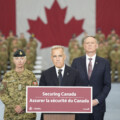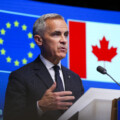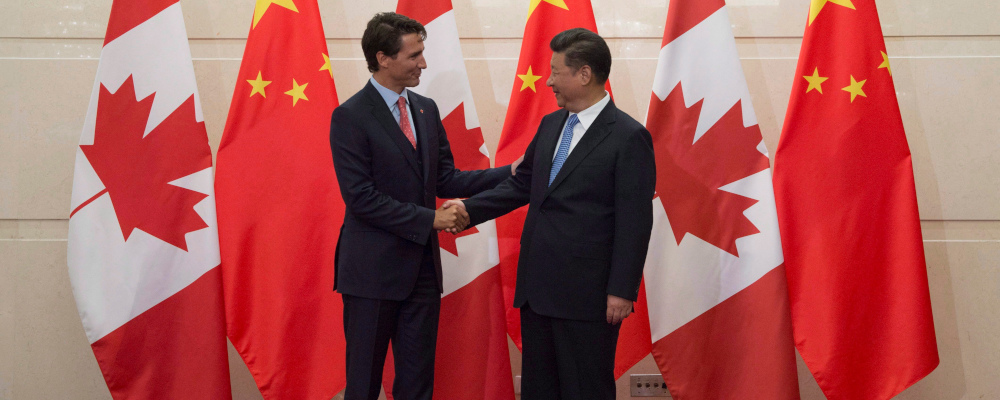Yesterday was an eventful day in Canada’s evolving relationship with China. A series of separate yet related developments reflect the complexity of managing Canada-China relations and the need for a clear-headed strategy rooted in our national interests.
It started with a joint statement from U.S. President Joe Biden and Chinese President Xi Jinping from the G-20 summit in Indonesia that struck a far more conciliatory tone than we’ve heard in months. The two leaders downplayed their countries’ geopolitical and technological rivalry (“there need not be a new Cold War” said Biden) and even dismissed the prospects of “decoupling and severing supply chains” because they “run counter to the principles of [the] market economy and undermine international trade policies.”
The impetus for the renewed message of cooperation is undoubtedly less about a long-term rapprochement and more about the short-term exigency of Russia’s potential use of nuclear weapons. Biden and Xi were unequivocal: they oppose “the use or threat of use of nuclear weapons in Ukraine.” This isn’t the first time that Xi has signaled his opposition either. He said something similar earlier this month following a meeting with German Chancellor Olaf Scholz in Beijing.
This common front is vital because as the West has come to isolate Russia with economic sanctions (including cutting energy exports) its economy has become increasingly reliant on China to such an extent that has come to be characterized as a “junior partner” and even a “vassal state” in the Chinese sphere of influence. China has in effect become the principal brake on Russia’s military escalation into highly dangerous territory.
Yet even as Biden and Xi talked up the need for cooperation on the nuclear file as well as climate change and food security, there were powerful reminders that the relationship between their countries has undergone something of a permanent rupture. It may not be a new Cold War per se but there’s no going back to the post-Cold War promise of what historian Niall Ferguson famously called “Chimerica.”
The first was a CBC report that the U.S. military is examining options to invest directly in Canadian mining projects that involve critical minerals for civilian and military products such as batteries, cars, electronics, and weapons. The news follows a recent announcement from the Trudeau government that it has ordered three Chinese companies to sell their interests in Canadian mining projects following a natural security review.
The two stories—effectively trading American state investment for Chinese state investment—indicate a concerted effort on the part of the Canadian and American governments to protect North America’s supply of critical minerals from China. It stands in sharp contrast to Biden and Xi’s lip service to “the principles of the market economy” and instead represents a political economy view about the trade-offs between national security and fidelity to free markets in our relationship with China.
The second development is breaking news that a Hydro Quebec employee has been charged with espionage for sending secrets to China. It follows last year’s story that two infectious disease scientists at the Public Health Agency of Canada are similarly under RCMP investigation for allegedly sharing sensitive information with Chinese authorities. These cases of high-level espionage involving strategic assets and even dangerous materials are a small window into Chinese efforts to gain access to Canadian institutions and steal ideas and secrets.
That they follow a shocking report of political interference in the 2019 Canadian federal election—including funding a “clandestine network of at least 11 federal candidates”—is bound to reinforce the Canadian public’s overwhelming sense that we must revisit the basic assumptions of our relationship with China.
The Trudeau government has been slower to move on this front than most of its western counterparts. It came to office with big ambitions for the Canada-China relationship—including a comprehensive free trade agreement—and seemed inclined to look away from the mounting evidence that Xi’s China is neither a reliable trading partner nor “responsible stakeholder.”
The mountain, however, eventually became too large to overlook. The unlawful detention of the two Michaels and the Chinese government’s ongoing obfuscation about the origins and spread of COVID-19 (which, by the way, ought to be a far bigger deal than it is) seem to have represented something of a crossroads.
In recent weeks, Ottawa has signaled a new course. The Trudeau government has committed, at least in rhetorical terms, to abandon its own Sinophile instincts. The Industry Minister, François-Philippe Champagne, spoken about the need for “decoupling.” And in a recent speech at the University of Toronto’s Munk School of Global Affairs and Public Policy, Foreign Affairs Minister, Melanie Joly, called China an “increasingly disruptive global force” and warned Canadian companies about the “geopolitical risks linked to doing business with the country.”
Champagne’s recent comments are especially notable because they epitomize the government’s slow yet significant shift. He was international trade minister in 2017 when the government was consulting on a Canada-China free trade agreement and one can still find a ministerial message from him on the departmental website about how “China is an important partner for Canada” and, notwithstanding growing trade volumes between the two countries, “there is room for us to do a lot more.” Now, in his role as industry minister, he has reversed himself: “What we want is certainly a decoupling: certainly from China, and I would say other regimes in the world which don’t share the same values.”
The one holdout may be the prime minister himself who, according to reports, was informed about the Chinese election interference several months ago and has seemingly done and said nothing about it. He also struggled through a weak and equivocal answer about China’s genocide of the Uyghurs at the ASEAN meetings on the eve of the G-20 summit.
The upshot: the Trudeau government still doesn’t fully know how to think about Canada’s relationship with China. It’s one step towards strategic decoupling and then one step back to empty engagement. We’re stuck in the self-made limbo of an uncertain strategy.
The problem, of course, is the world isn’t waiting for us to figure it out. As yesterday’s major developments show, the West’s relationship with China will be the defining feature of global security in the coming decades. It’s about time that Canada decided what it thinks about it.
Recommended for You

Trevor Tombe: How is Carney going to pay for his commitments? There are some tough choices ahead

Michael Bonner: Are we witnessing the last gasp of Iran’s Islamic Republic?

Need to Know: Yahoo, Alberta! You’re doing something right

‘He’s a master of globalization in a re-nationalizing world’: Michael Ignatieff on the domestic and geopolitical challenges facing Prime Minister Carney




